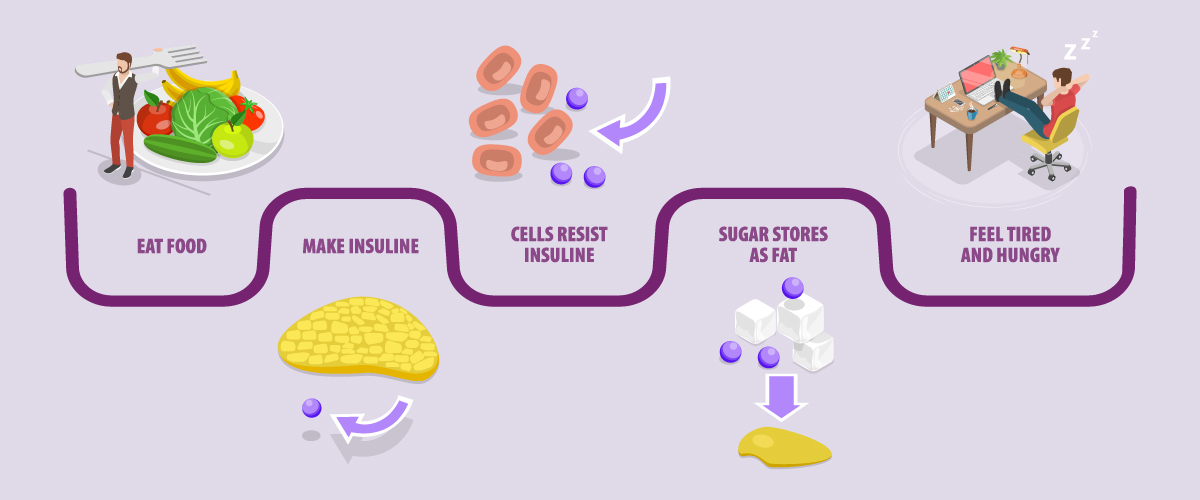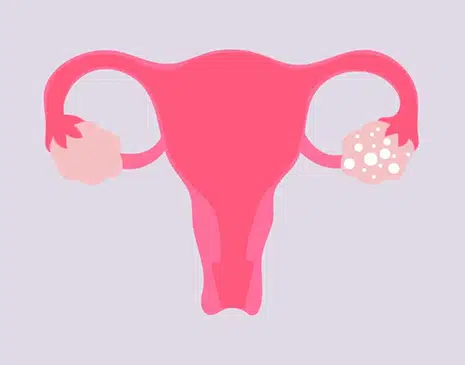Despite being a challenging and time-consuming condition to diagnose, research suggests that polycystic ovary syndrome (PCOS) is one of the most prevalent endocrine abnormalities among adult women. A systematic review and meta-analysis published in the Journal of Women’s Health in 2020 reported the global prevalence of PCOS to be 8.5% based on ultrasound criteria and 7.2% based on clinical criteria¹.
The exact cause of PCOS is unknown; however, it is believed to be caused by a combination of factors, including insulin resistance, changes in hormone production, and obesity. But does having PCOS guarantee a little extra weight around the waistline? And if so, how can women with PCOS manage their weight and prevent further weight gain?
It is important to note that the prevalence of PCOS may vary depending on the population studied, the diagnostic criteria used, and the methods of assessment.
What is polycystic ovary syndrome?
Polycystic ovary syndrome (PCOS) is a complex hormonal disorder that affects adult women. Although PCOS symptoms may vary from woman to woman, the most common PCOS symptoms include irregular periods, amenorrhea (what is amenorrhea?), excessive hair growth, acne, and cystic ovaries.
For a PCOS diagnosis, a woman must experience at least two of the following:
- Polycystic ovaries
- Elevated androgen levels
- Infrequent, irregular, or prolonged menstrual cycle
Women with PCOS have an increased risk of experiencing fertility issues and a higher risk of developing certain health conditions, such as Type-2 Diabetes, heart disease, endometrial cancer, and dyslipidemia – a condition marked by abnormally elevated cholesterol or fats in the blood²⁻⁵.
Does polycystic ovary syndrome cause weight gain?
A study published in the journal “Obesity Research & Clinical Practice” in 2019 found that the prevalence of obesity in women with PCOS ranged from 44% to 60%⁶. Another study published in the “Journal of Women’s Health” in 2020 reported that approximately 70% of women with PCOS are overweight or obese, with a mean body mass index (BMI) of approximately 30 kg/m2⁷.
These studies demonstrate a continued high prevalence of obesity in women with PCOS and highlight the need for comprehensive management strategies to address this issue.
How does PCOS cause weight gain?
PCOS is primarily caused by two main factors: insulin resistance and excessive production of the male hormones called androgens.
Insulin resistance
PCOS affects the body’s secretion and use of the hormone insulin – a hormone that helps the body use glucose for energy. When someone has PCOS, their cells become resistant to insulin signals, prompting the pancreas to produce more insulin. This is known as insulin resistance or impaired glucose tolerance. Too much insulin can lead to extra fat storage or weight gain, particularly around the midsection.
Excessive production of hormones
Secondly, PCOS can cause the body to produce more androgens. Androgens are essential hormones that play a role in reproductive health, emotional well-being, muscle function and growth, bone strength, and libido, to name a few. They can also interfere with ovulation and cause the formation of cysts in the ovaries. Androgens can also cause the body to store more fat.
PCOS is a complex disorder, and many factors can contribute to weight gain. Additionally, PCOS can cause the body to have difficulty breaking down fats, which then store in the body and lead to higher body weight. Understanding how PCOS can cause weight gain can help you develop a plan to lose weight and improve your health.

Ways to manage and lose weight with PCOS
While there is no cure for PCOS, maintaining a healthy lifestyle can help promote weight loss, lower blood glucose levels, improve high blood pressure and cholesterol, and lessen the severity of PCOS symptoms.
Some of the best ways to tackle PCOS weight gain involve making simple dietary changes and implementing healthy living habits. Here are some of the best ways for women with PCOS to reduce belly fat when aiming for a healthy weight range.
Get plenty of fibre
There is no one-size-fits-all solution for PCOS-related weight loss; however, increasing fibre intake can be helpful. Fibre helps to regulate blood sugar levels and promote feelings of fullness, both of which can benefit weight loss. Fibre-rich foods are often lower in calories and higher in nutrients, making them a healthy choice for women with PCOS who want to shed excess weight.
Good sources of fibre include fruits, vegetables, whole grains, legumes, and nuts.
Eat enough protein
Protein is an essential nutrient for everyone; however, it can be especially beneficial for women with PCOS. That’s because protein can help to regulate insulin levels, which is often a problem for women with PCOS. Protein also plays an essential role in building and maintaining lean muscle mass, which helps the body to burn more calories, and increases satiety, making it easier to stick to a healthy diet.
Protein can be found in various foods, including meat, poultry, fish, beans, and tofu. To make things simple, women with PCOS can supplement their healthy diet with a protein powder to ensure they hit their recommended daily intake for protein.
Eat healthy fats
Incorporating healthy fats into the diet can help women with PCOS manage weight for several reasons. Healthy fats help to promote satiety, reducing overall calorie intake and the risk of overeating. Healthy fats also help to boost metabolism and stabilise blood sugar levels, which are both important for women with PCOS since high blood sugar levels lead to weight gain.
When looking for healthy fats at the grocery store, keep an eye out for fatty fish like salmon, avocados, and nuts.

Include fermented foods in your diet
There is growing evidence that fermented foods can help women with PCOS with weight maintenance. Fermented foods are rich in probiotics, which are beneficial bacteria that help improve gut health. Good gut health contributes to weight loss by helping the body absorb nutrients and eliminate toxins more effectively.
Probiotics have also been shown to reduce inflammation, a common issue for women with PCOS. In addition, fermented foods are typically lower in sugar and calories than their non-fermented counterparts, making them a good choice for women trying to lose weight.
Limit processed foods and added sugars
One dietary change that may help women with PCOS lose weight is avoiding processed foods and sugar. Processed foods are high in unhealthy fats and low in nutrients that not only trigger insulin resistance but have the potential to worsen the symptoms of PCOS.
Sugar is also a major culprit in weight gain, as it causes spikes in blood sugar levels that can lead to cravings, overeating and emotional eating. By avoiding processed foods and sugar, women with PCOS can help to regulate their hormones and blood sugar levels, improve insulin sensitivity, and lose weight.
Avoid undereating
For women with PCOS, undereating can be especially harmful, as it can cause the body to produce more of the male hormone testosterone, which can worsen symptoms of PCOS. If you’re trying to lose weight and manage PCOS, make sure to eat enough calories to support your body and activity level.
Exercise regularly
Exercise is a key part of any weight loss plan, especially for women with PCOS. That’s because exercise can help to regulate insulin levels, boost metabolism and reduce inflammation. And, of course, exercise can help to burn calories and promote weight loss.
If you’re looking to lose weight with PCOS, aim for at least 30 minutes of moderate exercise most days of the week. This may include physical activity like walking, swimming, or cycling. Adding weight training into your routine may also be beneficial, as strength exercises can help to build muscle and burn even more calories.
Find out why exercise is good for your sex life?

Learn how to manage stress
Stress can trigger hormonal imbalances and make it more challenging to lose weight. By learning stress management techniques, such as meditation and mindfulness, women with PCOS can mindfully learn how to balance their hormones and improve their chances of successful weight loss.
Prioritise your sleep routine
Clinical studies indicate that sleep disturbances and disorders, including obstructive sleep apnea and excessive daytime sleepiness, occur more frequently among women with PCOS compared to comparison groups without the syndrome.
A study published in the “Journal of Clinical Endocrinology & Metabolism” in 2014 found that women with PCOS had a higher prevalence of OSA (33%) compared to women without PCOS (18%)⁸. A similar study published in the “Journal of Women’s Health” in 2015 reported that the prevalence of OSA was significantly higher in women with PCOS compared to control groups (25% vs. 13%)⁹.
Another study published in the “Journal of Clinical Sleep Medicine” in 2016 found that women with PCOS had a higher rate of EDS compared to control groups (38% vs. 22%) and reported that sleep disturbances might contribute to the increased prevalence of obesity and metabolic disturbances in women with PCOS¹⁰.
Therefore, getting enough quality sleep is essential for managing weight and preventing weight gain. Studies have shown that women with PCOS who achieve adequate sleep are more likely to lose weight than women with PCOS who don’t get enough sleep¹¹⁻¹⁵. Sleep helps regulate hormones, and women with PCOS often have hormonal imbalances that make it difficult to lose weight.
Do you know how your period is impacting your sleep cycle?
Other ways to treat PCOS
Maintaining a healthy weight can help manage PCOS by regulating hormones, improving mood, and easing symptoms of excess facial and body hair and acne. Aside from implementing lifestyle changes of regular physical activity, mindful eating, stress management techniques, better sleep hygiene, and losing weight if overweight, women with PCOS can look to medically proven methods of treatment for PCOS.
Medications for PCOS
Hormonal birth control methods, such as the oral contraceptive pill, can help regulate the menstrual cycle, reduce excess hair growth, improve acne, and prevent the womb’s lining from excessive thickening. Birth control pills and the diabetes drug metformin can also help women to manage insulin resistance.
Medications that block hormones can help reduce excess hair growth and scalp hair loss. Insulin-sensitising medications can help regulate menstrual cycles, improve ovulation and fertility, and assist with weight loss. Fertility medication can also help reduce potential pregnancy complications.
If you’re experiencing symptoms of PCOS, it’s important to speak with your trusted doctor or healthcare provider for advice on the best PCOS treatment plan to manage weight gain and ease symptoms.
Look after YOU with YOULY! With online access to the pill and all your repeats sorted.
Sources
- Wang, X, et al. “Prevalence of Polycystic Ovary Syndrome: A Systematic Review and Meta-Analysis.” Journal of Women’s Health. 2020 Apr;29(4):486-497. doi: 10.1089/jwh.2019.7907.
- Te Velde, E.R., Eijkemans, M.J., Habbema, J.D., Fauser, B.C., (2009). “Polycystic ovary syndrome and risk of cardiovascular disease.” Hum Reprod Update. 2009 Nov-Dec;15(6):593-604.
- Li, R., Zhang, Q., Yang, X., et al. (2010). “Metabolic and reproductive disorders in women with polycystic ovary syndrome: a systematic review and meta-analysis.” J Clin Endocrinol Metab. 2010 May;95(5):2038-49.
- Kjerulff, K.H., Zhang, J., Langenberg, P., (2008). “Polycystic ovary syndrome and the risk of endometrial cancer.” Gynecol Oncol. 2008 Oct;111(1):13-9.
- Glueck, C.J., Phillips, H., Cameron, D., Sieve, L., Wang, P., (2012). “Polycystic ovary syndrome and type 2 diabetes mellitus.” Endocr Rev. 2012 Oct;33(5):818-41.
- Misso, M.L., Costello, M.F., Garrubba, M., et al. “The prevalence of obesity in women with polycystic ovary syndrome: a systematic review and meta-analysis.” Obesity Research & Clinical Practice. 2019 Sep – Oct;13(5):453-460.
- Oerter Keil, K., Anderson, D., Rösler, A., et al. “Body weight and body composition in women with polycystic ovary syndrome – a cross-sectional study.” Journal of Women’s Health. 2020 Jan;29(1):69-76. doi: 10.1089/jwh.2019.7951.
- Baillargeon, J.P., Giudice, L.C. “Polycystic ovary syndrome and obstructive sleep apnea.” Journal of Clinical Endocrinology & Metabolism. 2014 Oct;99(10):E2066-72.
- Elsner, S., Thaler, L., Legro, R.S., et al. “Polycystic ovary syndrome is associated with a high prevalence of sleep-disordered breathing.” Journal of Women’s Health. 2015 Sep;24(9):692-9.
- Baillargeon, J.P., Dunaif, A. “Polycystic ovary syndrome, sleep and metabolic dysfunction.” Journal of Clinical Sleep Medicine. 2016 Oct 15;12(10):1313-1324.
- Sacks, F.M., Aroda, V.R., Boise, L.H., et al. “Comparison of weight loss among named diet programs in overweight and obese adults: a meta-analysis.” JAMA. 2014 Feb 5;312(5):923-33.
- Jakicic, J.M., Otto, A.D., Lang, W., et al. “Efficacy of lifestyle modification for long-term weight control.” Obesity Research. 2003 Jul;11(7):719-27.
- Bray, G.A., Ryan, D.H., Hennessy, E., et al. “Effect of sleep extension on the late-night snacking hormone and weight loss in women with obesity and obstructive sleep apnea.” Obesity. 2010 Apr;18(4):731-7.
- Elsner, S., Thaler, L., Legro, R.S., et al. “Polycystic ovary syndrome is associated with a high prevalence of sleep-disordered breathing.” Journal of Women’s Health. 2015 Sep;24(9):692-9.
- Baillargeon, J.P., Kuo, Y.F., Takahashi, P.Y., et al. “Sleep duration and cardiometabolic risk in women with polycystic ovary syndrome.” Journal of Clinical Endocrinology & Metabolism. 2015 Dec;100(12):4473-80.
- Ndefo UA, Eaton A, Green MR. Polycystic ovary syndrome: a review of treatment options with a focus on pharmacological approaches. P T. 2013;38(6):336-355.
- PCOS research: UCSF Center for Reproductive Health. UCSF. https://crh.ucsf.edu/research/fertility-research/pcos-research. Accessed January 20, 2023.
- Fernandez RC, Moore VM, Van Ryswyk EM, et al. Sleep disturbances in women with polycystic ovary syndrome: prevalence, pathophysiology, impact and management strategies. Nat Sci Sleep. 2018;10:45-64. Published 2018 Feb 1. doi:10.2147/NSS.S127475









